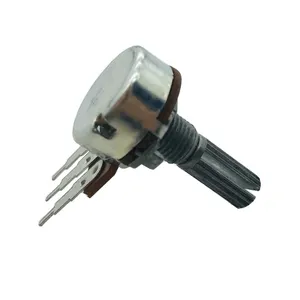Understanding Linear Potentiometers
A linear potentiometer is a type of variable resistor that features a straight, linear movement for the adjustment of resistance. It plays a crucial role in many electronic devices by enabling users to control electrical signals with precision. The main function of a linear potentiometer is to regulate voltage and current in a circuit, making it an essential component in various applications ranging from audio equipment to industrial machinery.
Types of Linear Potentiometers
Linear potentiometers can be classified into a few distinct types, each serving specialized functions and applications.
- Conductive Plastic Linear Potentiometers: These potentiometers utilize a conductive plastic element, offering excellent linearity and reliability. They are often used in precision applications.
- Wirewound Linear Potentiometers: Constructed using a wire wrapped around a ceramic former, these are ideal for high power applications and provide high accuracy and stability.
- Carbon Film Linear Potentiometers: Made from a carbon-based material, these are typically more economical and suited for applications where a lower lifespan is acceptable.
- Hybrid Linear Potentiometers: Combining elements of both conductive plastic and wirewound designs, hybrid potentiometers offer excellent performance across various conditions.
Applications of Linear Potentiometers
Linear potentiometers find extensive applications across numerous fields due to their versatility and effectiveness in controlling electronic signals. Here are some examples:
- Audio Equipment: Used in volume and tone control to allow for smooth and precise adjustments.
- Industrial Control Systems: Ideal for applications needing rotational or positional feedback, often found in automation machinery.
- Automotive Systems: Applied in adjusting components such as power window systems and seat position settings.
- Consumer Electronics: Common in devices like televisions for adjusting brightness and contrast, enhancing user experience.
Features and Advantages of Linear Potentiometers
Linear potentiometers boast several important features that contribute to their popularity in electronic design. The advantages of using them include:
- High Precision: These devices offer accurate resistance readings and control, critical where precision is necessary.
- Durability: Many models are built to withstand harsh environmental conditions, ensuring longevity.
- Easy Integration: Linear potentiometers can easily be integrated into existing systems due to their uniform design and standard sizes.
- Cost-Effectiveness: With various options available, users can select a model that balances performance and budget, making them accessible for many applications.
















































































































































































































